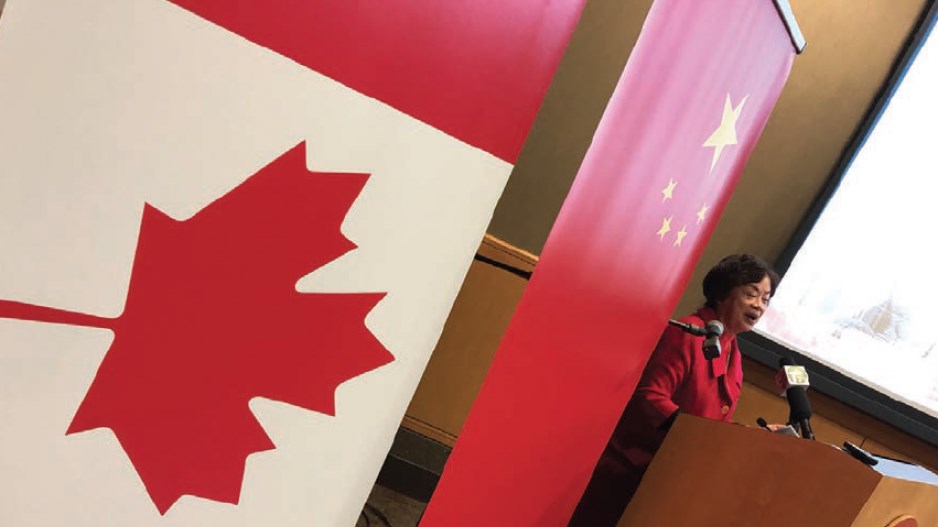Despite growing uncertainty over the future of Canada-China trade, interest from B.C. small and medium-sized businesses (SMEs) towards the Chinese market remains strong, say organizers of a local delegation heading to a major Shanghai trade show in November.
Officials from Vancouver-based Canada International Trade Promotion Society, which has been organizing the B.C. delegation to the China International Import Expo (CIIE) since last October, said the group had to turn away 12 of the 30 B.C. companies that applied to take part in the show, touted as the first of its kind by Chinese leaders.
In all, the 18 B.C. companies participating in the Canadian delegation to CIIE, which takes place November 5-10, will comprise a third of the 53 firms from Canada. The B.C. delegation also secured roughly 1,680 square feet of floor space at the Shanghai National Exhibition and Convention Center – the largest footprint of any Canadian province at the expo.
“I think this shows that B.C. is not only beautiful and rich in resources, but also holds tremendous potential in doing business with China,” said society president Jeannie Cheng. “The companies taking part are the representatives of that potential; these companies are confident that they can make some noise in the global market when given this opportunity for exposure.”
Beijing is touting the CIIE as a major step in China’s opening of its domestic market to foreign products, as well as a sign of the country’s commitment to free trade and a globalized economic system centred around the World Trade Organization.
It is the latest in a number of initiatives from Chinese President Xi Jinping to strengthen China’s clout in the global economy, with moves such as the One Belt, One Road initiative and the Asian Infrastructure Investment Bank being the most prominent of such efforts.
But the CIIE is also taking place at a tense junction for the global economy, as the United States and China are in the midst of rising trade tensions, throwing punitive tariffs and increasingly more heated rhetoric at one another.
The trade war has made a mark on the CIIE; media reports say that an official at the U.S. Embassy in Beijing confirmed that the United States is not planning to send any senior government officials to attend the high--profile Shanghai expo. Most other countries, however, have reportedly committed to sending high-level delegations, such as Great Britain’s expected envoy led by British trade minister Liam Fox.
Canada itself appeared to have been dragged into the fray with the newly signed U.S.-Mexico-Canada Agreement, which contains a clause interpreted by some as an American veto of any bid by Canada to pursue free trade with non-market economies. China is the largest of the non-market economies as identified by the World Trade Organization.
But Canadian Foreign Affairs Minister Chrystia Freeland has called that interpretation of the trade deal “misguided,” and Chinese officials in Vancouver said Freeland spoke last week with Chinese foreign affairs minister Wang Yi to reaffirm Canada’s interest in broadening trade with China – while not committing to an actual free-trade agreement negotiation.
“Minister Freeland expressed very clearly that the agreement will not negatively impact each country’s legitimate interests, and Canada will determine on its own accord how to proceed in free-trade negotiations with other countries,” said Kong Weiwei, China’s acting consul general in Vancouver. “China is appreciative of the update.”
Kong added that, despite the backdrop of global trade unrest, people shouldn’t see CIIE as a response to trade tensions with the United States.
“I have to remind our friends this entire process – the concept of the expo, the organization and the operation of the event – happened before the trade conflicts between certain countries took place,” Kong said. “So this is not a reactive move to something that may or may not have happened, but rather a proactive move on China’s part to further open its economy to the world.”
Among the B.C. companies taking part are Nanaimo-based FurCanada; Richmond’s Xypex Chemical Corp., maker of protective coatings for concrete, among other products; Canadian Pacific Algae Inc., which produces health supplements and creams; and clothing designer Mozen Fashion Co. Ltd. Cheng added that B.C. will host its main event, titled “Embracing China,” at the expo’s Canada pavilion on November 8. The hope, she said, is for the event to generate attention for B.C. companies, not only with show-goers, but also with the general Chinese public.
“There are 150,000 purchasers at the expo, all from different countries,” Cheng said. “These are not the purchasers you normally see at trade shows; they are not going to just take a stroll around the show floor, write a report, then go home. This time, the purchasers are on a mission; they represent companies of many different sizes, but they have a mission to buy what is good, what the consumers are asking for. So we have to embrace this opportunity.”
The CIIE is expected to draw more than 2,800 companies from 130 countries and jurisdictions to attend.



